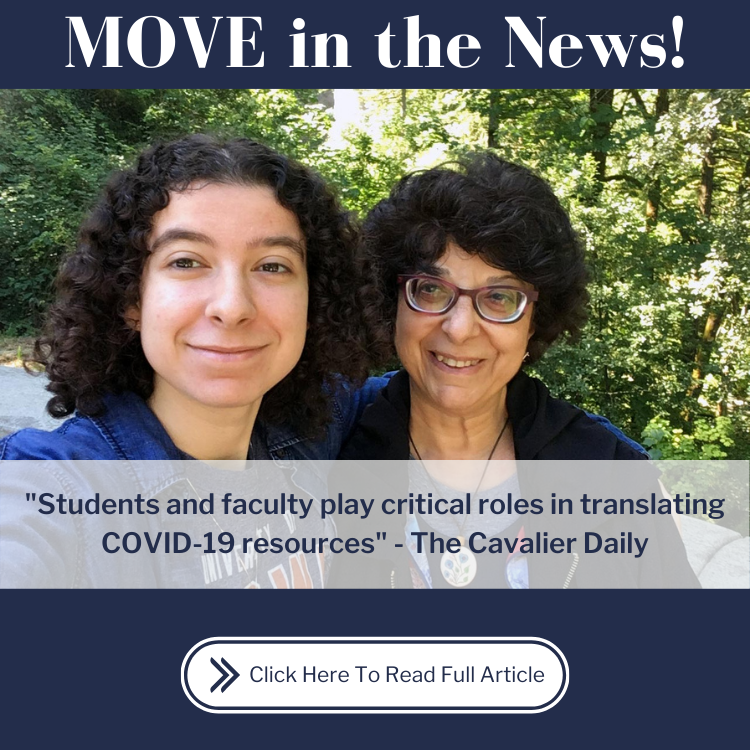The Multilingual Outreach Volunteer Effort (MOVE)
Who are we?
We created MOVE during the early days of the COVID-19 pandemic to address a gap in communicating critical information to those with limited English and digital resources. As both the number of volunteers and requests have grown, we are now able to focus on broader community translation needs, offering our international neighbors the opportunity to receive important information in their own languages, while promoting multilingualism at UVA.
MOVE volunteers are UVA language students and language faculty, heritage speakers, and immigrants, representing 50+ languages.
What do we do?
We assist with small translating and interpreting requests from Charlottesville-area non-profit community-based and educational organizations, as well as units within UVA.
What don't we do?
As a volunteer organization:
- We do not translate medical documents or interpret medical procedures (We leave this to the professionals!).
- We do not do work outside of the UVA/Greater Charlottesville Community
- We do not translate excessively long documents!
- We do not do professional, paid translating and interpreting. All of our partners understand that we are volunteers and we cannot guarantee error-free translations.
 Do I have to be bilingual?
Do I have to be bilingual?
You do not need to have native-level proficiency or be bilingual to participate. Our volunteers have a wide range of translating skills and our translations are done collaboratively. Some people even involve their fluent families! You can always ask others for help. MOVE seeks to help our community with language resources while promoting multilingualism at UVA.
How do I join?
If you are interested in joining us, please fill out this form. Once you have filled out the form, we will contact you with our next translation/interpretation tasks. Contact us with questions at translations@virginia.edu.
Volunteer Frequently Asked Questions (FAQs)
- What is the time commitment for volunteers?
Volunteers decide how frequently they want to participate. Each request is sent to all volunteers who speak the language needed; it is up to the volunteer to choose which translating/interpreting requests to accept.
- How often do we receive translation requests?
Translation requests occur up to a few times a week; the requests fluctuate throughout the year. We send out requests as we receive them from our partners. Some languages are requested more than others, based on our partners’ needs.
- Do volunteers need to be fluent in the target language?
MOVE does not expect fluency or perfection; we do our best to get basic information to the community in the language they understand best. Some of our volunteers are completely bilingual, while others are committed language learners!
- Are there ever in-person opportunities?
We occasionally have in-person interpreting opportunities. We only accept requests where current COVID-19 protocols are followed. In-person events are not required. We offer some social gatherings so that MOVE translators can meet each other!
- What are the expectations of MOVE volunteers?
- We expect volunteers to be realistic when committing to a project.
- We expect volunteers to complete projects to the best of their ability.
- We expect volunteers to try to complete projects by the specified deadline.
- We expect volunteers to communicate about any aspect of the project that is unclear, to ask for help when needed, and to keep us updated about progress.
- What is the process for translating a request?
- When MOVE receives a request, we will send it out to the appropriate language team(s). Volunteers from that team step up to help translate as they are able.
- Work is done collaboratively through a shared Microsoft Word Document.
- Volunteers have access to an English version of the document, as well as translating guidelines and resources.
- Translators log their work on our “Translation Log” so we can see who has participated and when a project is completed.
- What are some examples of past translations/interpretations?
- Volunteers worked with a group of UVA medical students translating StreetSheets (a monthly document with resources including unemployment relief, emergency housing, food, etc.) for people with limited English abilities and computer access.
- Volunteers interpreted at Albemarle High School’s Open House event welcoming families who speak other languages and introducing them to community resources.
- Volunteers provided language help to organizations including Blue Ridge Health District, UVA Equity Center, International Family Health Clinic, and many others.
- What languages are the most requested?
- Arabic
- Dari
- Farsi
- French
- German
- Mandarin
- Nepali
- Russian
- Spanish
- Swahili
- Turkish
- Vietnamese
Do you need something translated?
If you would like to submit a request for translation, please visit this link.
